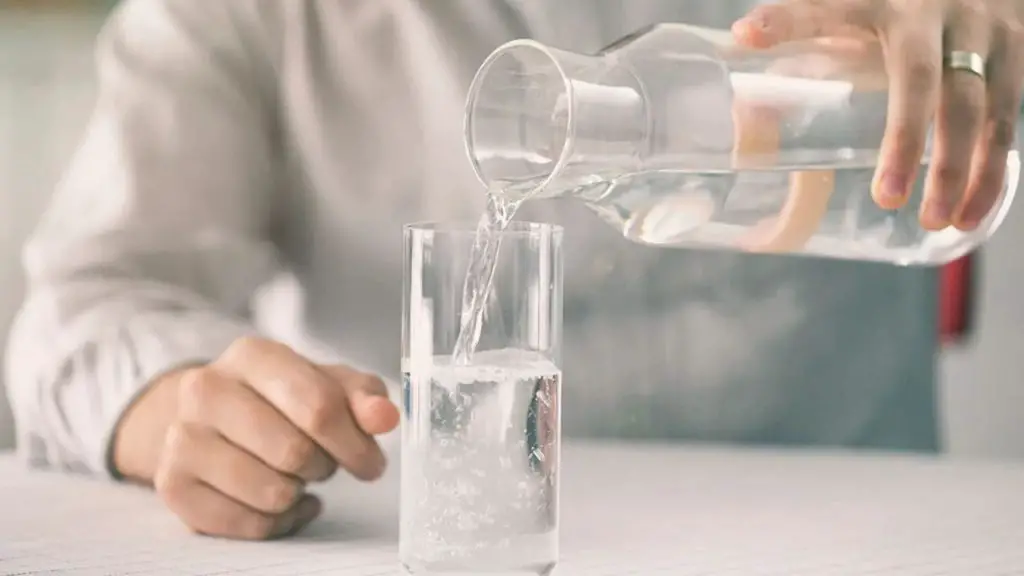Water is the ultimate thirst quencher. When we are thirsty, drinking a glass of water or another beverage containing water, such as juice or tea, quickly relieves our dry mouth and other uncomfortable symptoms.
But what happens when you stop drinking water for a day, a week, or even longer? What impact would that have on your body? Would you experience any negative side effects?
The answer is yes! When you stop drinking water, several negative things occur almost immediately. Your body begins to dehydrate in response to not having enough water available. The result of this dehydration can have serious consequences if it goes untreated.
Let’s take a closer look at what happens when you stop drinking water and how you can avoid the side effects associated with dehydration.

What Happens When You Stop Drinking Water?
When you become dehydrated, your body will attempt to retain all the water it can. This can result in a number of unpleasant side effects, including:
- Dry mouth: You’ll be extremely thirsty, but your mouth will feel as dry as the desert sand. You may find yourself producing a lot of spittle, but there will be little moisture in it. If you’re unable to quench your thirst, it can cause significant damage to your mouth and gums.
- Thirst: You may become so thirsty that it’s painful to move. You may experience headaches and feel extra tired.
- Headaches or migraines: As well as being extremely thirsty, you may find yourself experiencing headaches or migraines. This is caused by the lack of water in your system.
- Fatigue: When you’re dehydrated, your body uses a lot of energy attempting to retain water. This can leave you feeling tired and lethargic.
- Low blood pressure: When you’re dehydrated, your blood pressure can drop. This can cause dizziness and nausea.
- Cloudy thinking: Your brain requires a certain amount of water to function properly. Without it, you may find it difficult to concentrate or focus.
- Bad breath: If you’re suffering from dehydration, you may notice that your breath smells funny. This is caused by the bacteria in your mouth growing out of control.
- Constipation: One of the first things your body will attempt to do when dehydrated is stop digestion. If you’re suffering from dehydration, you may find yourself struggling to go to the toilet.
- Tingling hands and feet: You may find that your hands and feet start to tingle. This is a sign that your blood pressure is dropping and not enough blood is reaching your extremities.
Short-Term Side Effects of Not Drinking Water
When you stop drinking water, you can experience some short-term side effects, such as headaches, nausea, and dizziness. These short-term side effects are your body’s way of letting you know that you are dehydrated. If you don’t drink water, your blood will thicken and your blood pressure will rise.
This is because your kidneys aren’t functioning properly, and they can’t get rid of excess sodium that your body doesn’t need. When you are dehydrated, your kidneys don’t flush sodium from your body as efficiently as they normally would. This can increase your blood pressure and make you feel lightheaded.
When you become dehydrated, your brain also uses more water. When you don’t drink enough water to flush out the toxins in your blood, they can build up in your brain and cause headaches.
Dangers of Dehydration
As well as experiencing several unpleasant side effects, when you’re dehydrated, you risk serious long-term health issues. These may include:
- Muscle cramps: When you’re dehydrated, your muscles are less efficient at converting glucose into energy. This can result in cramps, joint pain, and headaches.
- Increased risk of heart attack or stroke: When your heart doesn’t have enough fluid to function properly, it’s more likely to go into cardiac arrest.
- Kidney damage: The kidneys are responsible for filtering toxins and impurities from your blood. When they are dehydrated, they’re less able to do their job. This can lead to kidney damage or kidney failure.
- Weight gain: Being dehydrated can lead to cravings for sugary or salty foods. This can cause weight gain and make it difficult to lose weight.
Long-Term Side Effects of Stopping Water Consumption
If you’re unable to quench your thirst and stop consuming water, you risk dying from dehydration. This would take around three to seven days, depending on the rate at which your body is able to produce water naturally. However, if you continue to avoid water and don’t consume any liquids, you’ll be at risk of serious kidney damage.
This can happen in as little as 48 hours. When you stop drinking water, your body produces a type of acid that can eventually cause irreversible kidney damage. This is the most serious long-term side effect of stopping water consumption.
Conclusion
When you’re dehydrated, your body isn’t able to operate at its full potential. You may experience headaches, fatigue, and a reduced ability to concentrate.
You’re also at risk of developing long-term health issues such as kidney damage. You can avoid these negative side effects by drinking enough water each day.
The amount of water you should drink per day differs from person to person. It depends on factors such as your age, weight, and level of activity. Most adults require between two and three liters of water per day. If you’re feeling thirsty, you should already be halfway towards that amount.
If you’ve been neglecting to drink enough water, it’s important to correct the situation as soon as possible. The sooner you start rehydrating, the less damage you will do to your body.
Additional Contents:
